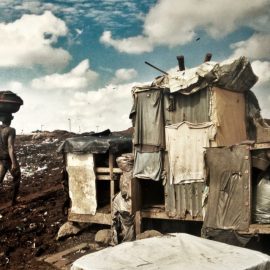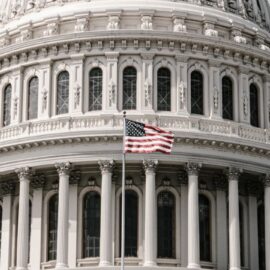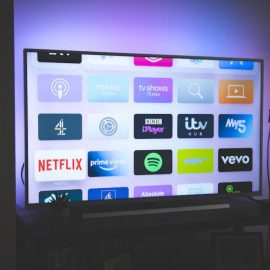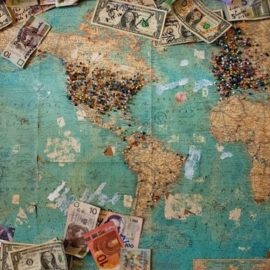
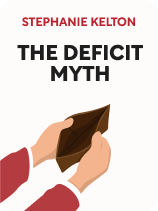
This article is an excerpt from the Shortform book guide to "The Deficit Myth" by Stephanie Kelton. Shortform has the world's best summaries and analyses of books you should be reading.
Like this article? Sign up for a free trial here .
Why does inflation occur? Is inflation a natural occurrence or is it caused by external forces?
In her book The Deficit Myth, Stephanie Kelton—a former Senate Budget Committee staffer and 2016 campaign adviser to Bernie Sanders—discusses inflation in depth. Kelton believes that inflation occurs naturally and is not a result of government policies.
Continue reading to learn about the causes and effects of inflation.
What Causes Inflation?
Economist Stephanie Kelton writes that politicians, the media, and the general public take it for granted that large federal budget deficits are clear evidence that the government is spending too much on a yearly basis and living beyond its means.
But, as we’ve seen, any government that has monetary sovereignty (like the United States) has near-unlimited spending power and can sustain large deficits for long periods of time, because they can always create the money they need to meet any spending demands.
However, Kelton does acknowledge that there is a real limitation on how much the government can spend—inflation. Inflation is the constraint on our economy that limits how many goods and services we can produce without generating unsustainable price increases.
So, why does inflation occur? Kelton writes that inflation can occur “naturally” in the economy. Often, it doesn’t result from any policy decisions at all, but rather, from external supply shocks that boost prices—like a drought or hurricane that makes certain agricultural products scarce. But it can also come on the demand side, if consumers begin to demand goods and services faster than the economy can produce them.
| Baby Boomers, Demographics, and the Great Inflation of the 1970s Other economists agree with Kelton’s point that inflationary and deflationary pressures can occur in the economy entirely independent from the decisions of policymakers—even from large-scale demographic changes. Some economics commentators have argued that this is precisely what happened during the Great Inflation of the 1970s, which saw interest rates rise to nearly 20%. This famous period of rising prices has been attributed to a variety of factors, including oil supply shocks, a glut in the money supply due to high government spending on the Vietnam War and Great Society programs, and Richard Nixon’s ending of wage and price controls. However, some economists believe that the massive rise in inflation during the 1970s was caused by the Baby Boomers—the demographic cohort generally defined as those born between 1946 and 1964, at the time the largest age group—all entering the workforce and their prime consumption years at the same time. According to this argument, the economy at the time simply lacked the productive capacity to accommodate this sudden new influx of workers and consumers, leading to a situation in which more people were chasing a fixed supply of goods and services—a classic recipe for inflation. |
The Money Supply
Kelton argues that inflation can happen to an economy regardless of the size of the fiscal deficit. But she notes that traditional economics does not accept this view.
According to the conservative economist Milton Friedman (1912-2006), inflation is caused by excesses in the money supply. When the government (or, more specifically, the Federal Reserve, the central bank of the United States) adds too much money to the economy (usually in an attempt to boost employment), it drops unemployment below its “natural” rate—the minimum amount of unemployment that monetarists like Friedman believe an economy requires to avoid tipping over into inflation.
Friedman taught that any employment gains achieved through aggressive fiscal policy would ultimately prove self-defeating, because inflation would simply eat away people’s wages. His solution was to have the Federal Reserve limit the money supply to keep prices stable.
| Do Large Deficits and a Loose Money Supply Really Lead to Inflation? In Capitalism and Freedom, Milton Friedman argued that the Federal Reserve should in fact focus solely on controlling the money supply as its core responsibility (since that is the one thing it can directly control) and pay less attention to full employment and price stability, over which it has a far more indirect effect. According to Friedman, the Federal Reserve should operate strictly according to rules about governing the money supply and set reasonable targets for its growth. He recommends a rate of growth between 3% and 5% per month. Friedman argues that this would make the central bank’s actions more stable and predictable. It’s worth noting that Friedman’s warnings about the self-defeating effects of deficit spending have not necessarily aligned with subsequent events. Since the surpluses of the 1990s, the U.S. federal budget has been marked by large and persistent deficits as the nation has grappled with two recessions, two wars, and the Covid-19 pandemic. In fact, the nation went from a $236 billion surplus in fiscal year 2000 to a $779 billion deficit in 2018, a net swing of over $1 trillion. And yet, throughout this period, inflation has been persistently low, consistently falling well below the Fed’s 2% inflation target. |

———End of Preview———
Like what you just read? Read the rest of the world's best book summary and analysis of Stephanie Kelton's "The Deficit Myth" at Shortform .
Here's what you'll find in our full The Deficit Myth summary :
- A look at national debt through the lens of Modern Monetary Theory
- How public discourse about national debts and deficits gets the facts wrong
- Why MMT says the U.S. government could finance any program it wishes to create


